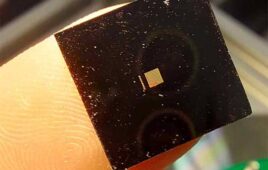
[Image from unsplash.com]
The sensors offer a way for cancer patients to be remotely monitored. The sensors and algorithm can detect objective changes in patient behavior to determine if symptoms are getting worse. Indications of worsening symptoms and side effects could help doctors intervene before the next scheduled clinic visit.
UPMC Hillman Cancer Center and the University of Pittsburgh conducted a study with 24 patients who were receiving chemotherapy treatment for gastrointestinal cancer at UPMC Hillman Cancer Center. The patients were instructed to carry a smartphone for four weeks while continuing with their daily routines. The researchers developed software for the smartphone that could passively and continuously collect data relating to behavior patterns like calls and texts sent and received, smartphone apps used and the movement or location of the phone.
Patients on the study were also asked to rate the severity of 12 common symptoms at least once a day. Each day could be a “higher-than-average burden,” “average burden” or “low burden.” That data was then collected by the researchers to create an algorithm to determine the patient’s high-symptom, average-symptom and low-symptom days with 88% accuracy.
“We found that on days when the patients reported worse-than-average symptoms, they tended to spend more time being sedentary, moved the phone more slowly, and spent more minutes using apps on the phone,” Carissa Low, lead author of the study and assistant professor of medicine and psychology at the University of Pittsburgh, said in a press release. “Collecting these objective behavioral measures from smartphone sensors requires no additional effort from patients, and they could prove beneficial for long-term monitoring of those undergoing arduous cancer treatments or those with other chronic illnesses.”
The researchers plan to further their research to determine if the same algorithm could be used to identify complications after receiving cancer surgery. They are also currently in the process of working with healthcare providers to use their remote monitoring in clinical care.
The research was published in the Journal of Medical Internet Research and was funded by grants from the National Cancer Institute and by a Manners Faculty Development Award from the University of Pittsburgh Center for Social and Urban Research.




